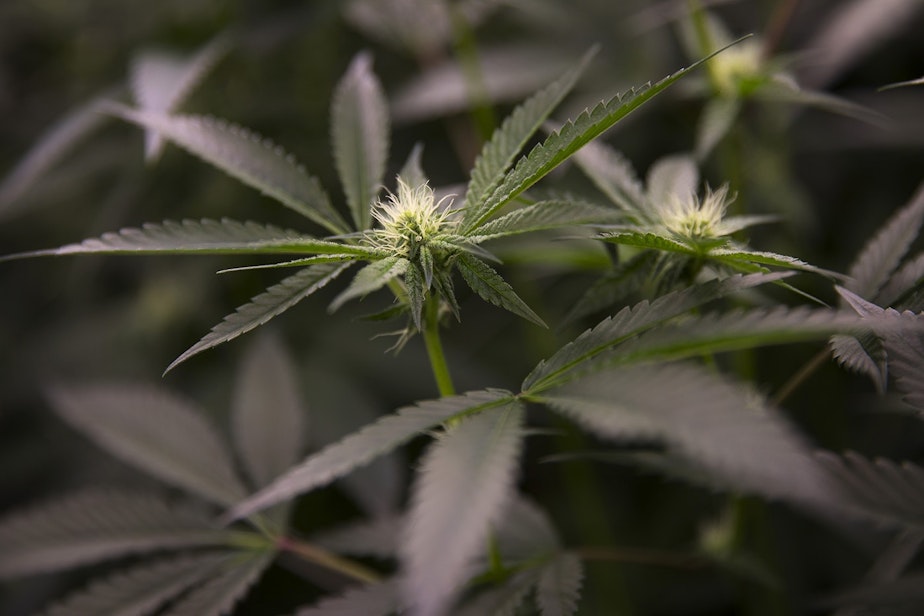CBD mascara? What will they think of next?

If the hype is to be believed, CBD will do everything from plump lashes to cure cancer.
Both of these claims are dubiously scientific and totally unregulated. But the compound has been proven effective in treating epilepsy and chronic pain – and its availability in the U.S. has increased thanks to a surprising legislative shepherd: the gentleman from Kentucky, Sen. Mitch McConnell.
KUOW's Bill Radke spoke to Bruce Barcott, deputy editor of cannabis publication Leafly, about what to believe — and what to doubt — about CBD.
Cbd Buildout
Interview highlights have been lightly edited for clarity
Bill Radke: What is CBD?
Bruce Barcott: CBD is one of the main cannabinoids that are in the cannabis plant, also known as marijuana and pot. While THC is the substance that that gets you high and gets you intoxicated, CBD is another compound that you can extract from the cannabis plant that we learned, many years ago, has some pretty profound effects on folks who are dealing with severe epilepsy. It will calm those seizures — not for everyone — but for a number of patients.
Over the last 10 years, the uses of CBD have expanded. Folks take low doses of CBD now to deal with things like anxiety and pain relief.
In the last year, and especially the last six months, the interest in CBD has exploded. Folks have been testing the waters with the legality of CBD because the substance exists in this very grey legal space.
Kind of like marijuana — legal in Washington state, but federally illegal?
Barcott: Right, but CBD is much further toward the legal end of the spectrum. You can or go online and order from many hundreds of companies that will send you CBD products in the U.S. mail. You can even go in a number of stores. My son works as a stocking clerk at a corner store on Bainbridge Island and they now sell CBD-infused water.
What it is CBD supposed to do for you in that water?
There are many claims about CBD, and some of them we know are true. At the higher end of the truth spectrum we have CBD's effects on easing symptoms of people who have epilepsy and what CBD can do to ease chronic pain.
The people who want to drink CBD in their coffee every morning is, so far, untested. Some people claim that it helps to stabilize their mood every day, that it helps with their anxiety. But those are things that have not been clinically tested, so they're completely anecdotal at this point.
What we do know is that there is yet to be shown any actual harm coming from imbibing CBD. It's not addictive. The World Health Organization has come out with a report saying they’ve looked at it and they're not going to classify it as a harmful drug. They haven't found any severe side effects or addictive properties with CBD.
So what about CBD in food?
Barcott: That’s where things get a little interesting. It's s not yet regulated by the FDA here in the U.S. So if you go online and order CBD from a vendor in- or out-of-state, you're getting something that's unregulated and therefore untested. Ironically, if you buy CBD from a state-licensed, legal cannabis store here in Washington, you're getting a product that actually is tested, clean, and you know exactly what the potency is. Outside of state-licensed cannabis stores, you really have no way of knowing.
I've heard that singer-actress Mandy Moore says CBD relieves her pain from walking around in high heels, and you mentioned that CBD also helps stabilize people’s moods and ease anxiety. So wait a minute, is it psychoactive or isn't it?
Barcott: A couple of years ago at Leafly, we had a debate about the word ‘psychoactive.’ If CBD is not psychoactive, how is it hitting your brain? We decided to move from the word ‘psychoactive’ to the word the ‘intoxicating’, where THC is intoxicating and CBD is not. They're both psychoactive in that they do have an effect on your mind.
I know it's in moisturizers, makeup, and other topical creams. Why is that?
Barcott: I was actually first introduced to this about five years ago when I met two dancers with the Pacific Northwest Ballet who swore by this product called Kush Cream; it was essentially a THC and CBD infused ointment. They’re pro athletes, they have aches and pains, but they really had to watch their intake of pain relievers like Advil because of possible adverse effects. This topical cream was something they could use instead of those instead of other potentially more harmful treatments.
I have an older relative who is in his 80s and he has really difficult pain in his hands, and so I brought him over a number of jars of this THC- and CBD-infused cream. I told him that while I could not promise him that this would work, it works for some people. So he gave it a try. Three weeks later he asked for more of the cream because it actually seemed to help a bit.
So one of the reasons that CBD is entering the national conversation and ending up in things such as topical creams is that people now have another alternative to opioids, which are much harder and more dangerous drugs to deal with pain.
What does it taste like when it's infused in things like water and other consumable products?
Barcott: It's tasteless. You know, the ointment that I rub on my knees during old man Hockey League games on Wednesday night kind of smells a little a little weed-y, but that's about it. I use it instead of Icy Hot for my knees.
Produced for the web by Brie Ripley.




